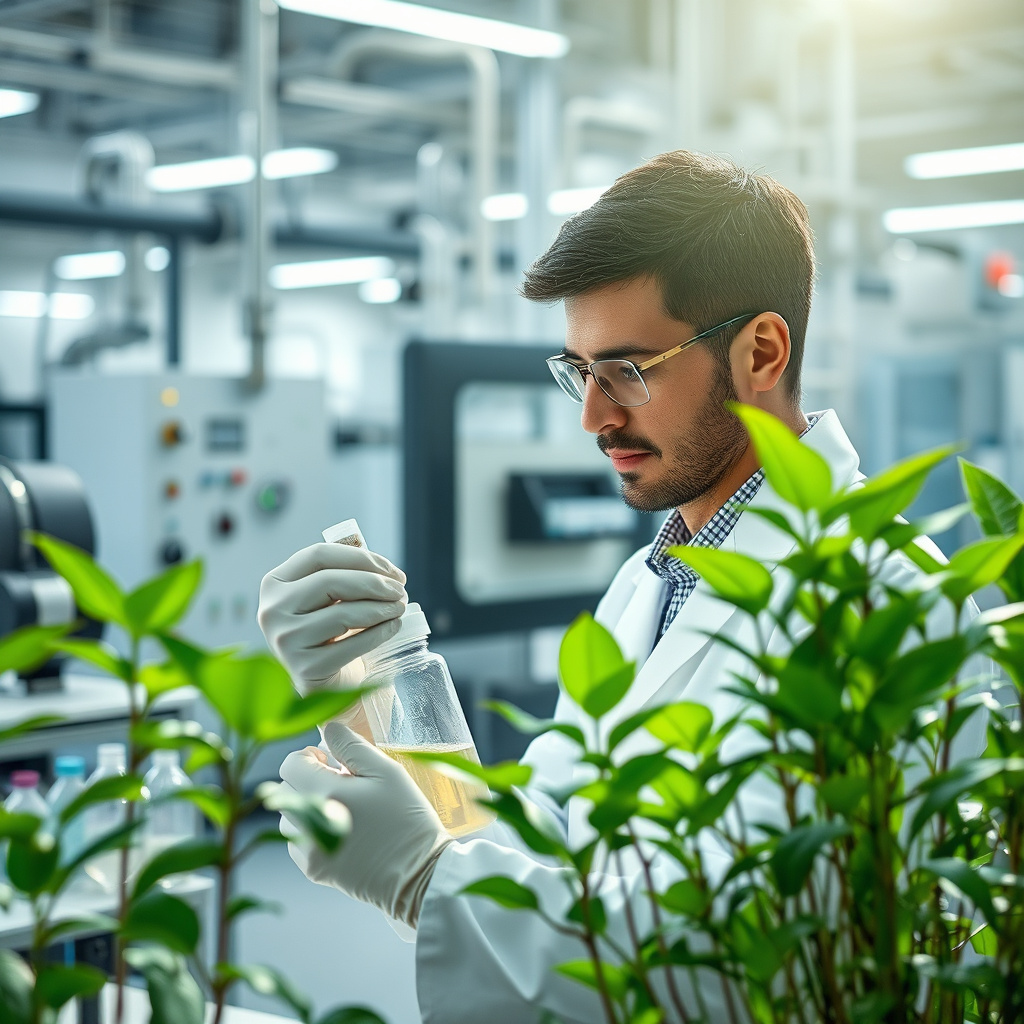How glycerin can help to reduce the carbon footprint in industry involves its sustainable production and versatile applications in various sectors.
How glycerin can help to reduce the carbon footprint in industry? This question is becoming increasingly relevant as companies seek sustainable solutions.
In this post, we will explore the significant role glycerin plays in minimizing environmental impact.
Join us to learn how this versatile compound not only benefits your products but also makes a positive contribution to our planet.
The Role of Renewable Resources in Sustainable Practices
In the quest for a more sustainable future, the role of renewable resources has become increasingly vital. As we navigate the complexities of climate change and environmental degradation, it’s essential to integrate these resources into our daily practices. Renewable resources, such as solar, wind, and biomass, offer sustainable alternatives that can significantly reduce our environmental impact.
Understanding Renewable Resources
Renewable resources are naturally replenished and include solar energy, wind power, hydroelectric energy, and biomass. These resources are not only sustainable but also help in minimizing greenhouse gas emissions. For instance, using solar panels to harness sunlight can power homes and businesses without depleting natural resources. In this context, the adoption of renewable energy sources is crucial for reducing our reliance on fossil fuels, which are a significant contributor to pollution and climate change.
The Connection to Glycerin
One interesting aspect of renewable resources is their intersection with various industries, including the production of glycerin. As a byproduct of biodiesel production, glycerin is an excellent example of how renewable resources can be effectively utilized. It serves multiple purposes—from being a key ingredient in cosmetics to acting as a humectant in food products. The versatility of glycerin underscores its potential in promoting Sustentabilidade practices within various sectors.
Benefits of Integrating Renewable Resources
The integration of renewable resources into industrial practices offers numerous benefits:
- Reduction of Carbon Footprint: Utilizing renewable energy sources can significantly lower carbon emissions, contributing to a greener planet.
- Economic Advantages: Over time, relying on renewable resources can lead to cost savings as technology advances and becomes more efficient.
- Energy Independence: By harnessing local renewable resources, communities can reduce their dependence on imported fossil fuels.
Glycerin and the Sustainability Narrative
The production and use of glycerin, particularly in its bulk form, play a pivotal role in the sustainability narrative. Companies that prioritize sourcing glycerin from renewable resources are not only meeting market demands but also contributing to a more sustainable industry. By partnering with reliable glycerin manufacturing companies and glycerin suppliers, businesses can ensure they are using high-quality, eco-friendly products.
For instance, a glycerin wholesale distributor can provide various grades of glycerin, including food-grade and cosmetic-grade options. These suppliers are essential in making glycerin more accessible and promoting its use in sustainable practices. As more industries recognize the importance of sustainability, the demand for responsibly sourced glycerin will likely grow, reinforcing the connection between renewable resources and sustainable industry practices.
Looking Ahead
As we continue to explore the benefits of renewable resources, it is clear that their role in promoting Sustentabilidade is indispensable. The use of glycerin, particularly from renewable sources, exemplifies how industries can innovate while being environmentally conscious. This integration not only fosters a sustainable future but also creates new opportunities for businesses and communities alike. By choosing to invest in renewable resources, we can all contribute to a healthier planet for generations to come.
Understanding Glycerin: A Versatile Ingredient for Eco-Conscious Companies
The journey towards a more sustainable future has led many companies to explore eco-friendly ingredients that can significantly reduce their environmental impact. One such ingredient that stands out is glycerin. This versatile substance, derived from renewable resources, plays a crucial role in various industries, including cosmetics, food, and pharmaceuticals. Its ability to serve multiple functions makes it a favorite among eco-conscious companies striving for sustainability.
What is Glycerin?
Glycerin, also known as glycerol, is a colorless, odorless liquid that is sweet-tasting and non-toxic. It is commonly produced through the process of saponification, where fats and oils are converted into soaps and glycerin. As a byproduct of this process, it has garnered attention not just for its utility but also for its eco-friendly attributes. Companies are increasingly turning to glycerin manufacturers that prioritize sustainable practices, ensuring that the ingredient is sourced responsibly.
The Ecological Benefits of Glycerin
One of the most compelling reasons for companies to incorporate glycerin into their products is its environmental benefits. Here are some key points to consider:
- Renewable Resource: As a byproduct of vegetable oils, glycerin is derived from renewable resources, making it a smart choice for companies aiming to minimize their carbon footprint.
- Biodegradable: Unlike many synthetic ingredients, glycerin is biodegradable. This ensures that products containing it break down naturally, reducing pollution and environmental harm.
- Versatility: Whether it’s used as a humectant in skincare products or as a sweetener in food, glycerin serves a multitude of purposes, allowing companies to streamline their ingredient lists and enhance product performance.
Glycerin in the Manufacturing Process
For businesses looking to adopt more sustainable practices, understanding the glycerin production process is essential. Working with a reliable glycerin supplier or glycerin wholesale distributor can ensure that the sourcing aligns with ethical standards. This not only helps in reducing the overall carbon footprint but also supports local economies when companies choose regional suppliers.
Applications in Various Industries
The applications of glycerin extend beyond just cosmetics and food. In the pharmaceutical industry, it is used as a solvent and preservative, enhancing the shelf life of products while maintaining safety. In the realm of personal care, glycerin acts as a moisturizer, attracting water to the skin and providing hydration. As companies seek out glycerin for cosmetics, they often turn to specialized suppliers who can provide bulk options, ensuring they have enough supply for their manufacturing needs.
In the current landscape, where consumers are more aware of the environmental impact of their purchases, adopting ingredients like glycerin can significantly enhance a company’s reputation as a leader in sustainability. By sourcing glycerin thoughtfully, companies can contribute to a greener future while meeting consumer demand for eco-friendly products. Whether you are looking to buy glycerin in bulk or seeking a dedicated vegetable glycerin supplier, the options available today are plentiful and designed to support sustainable practices.
Innovative Applications of Glycerin in Reducing Emissions
As industries strive to adopt more eco-friendly practices, the role of glycerin in promoting sustainability has gained significant attention. This versatile compound, derived from various renewable sources, has emerged as a key player in reducing emissions across multiple sectors. Let’s explore some innovative applications of glycerin that contribute to a greener future.
Glycerin as a Biofuel Additive
One of the most promising applications of glycerin is its use as a biofuel additive. In the quest for cleaner energy, glycerin can enhance the combustion efficiency of biodiesel, resulting in lower emissions of carbon monoxide and particulate matter. This application not only improves fuel performance but also helps in utilizing waste glycerin produced during biodiesel manufacturing. By integrating glycerin into the biofuel production process, industries can effectively reduce their overall carbon footprint.
Emission-Reducing Agents in Industrial Processes
In the manufacturing realm, glycerin is being recognized for its potential as an emission-reducing agent. When employed in various industrial processes, such as in the production of plastics and textiles, glycerin can replace more harmful solvents and chemicals. This switch not only minimizes toxic emissions but also enhances the safety and sustainability of the production environment. Companies sourcing glycerin from reputable glycerin suppliers can significantly reduce their environmental impact while maintaining high-quality standards.
Glycerin in Agriculture: A Natural Solution
In agriculture, glycerin serves as an innovative tool for reducing greenhouse gas emissions. When used as a soil conditioner or fertilizer additive, it can improve soil health and enhance plant growth. This not only leads to better crop yields but also promotes carbon sequestration in the soil. As farmers look for sustainable practices, the availability of bulk glycerin from trusted sources provides an effective way to enhance agricultural productivity while contributing to a healthier ecosystem.
Glycerin in the Food Industry
The food industry is also tapping into the benefits of glycerin. As a food-grade ingredient, glycerin can serve as a humectant, preserving moisture in food products. By improving shelf life and reducing waste, glycerin helps in minimizing the overall carbon emissions associated with food production and distribution. Companies seeking to incorporate eco-friendly practices can partner with reliable food grade glycerin suppliers to access this versatile ingredient, ensuring both quality and sustainability.
Future Prospects and Glycerin Innovation
As the world moves towards more sustainable practices, the innovative applications of glycerin will continue to expand. Researchers and industry experts are exploring new methods to utilize glycerin in various sectors, further enhancing its role in reducing emissions. By collaborating with glycerin manufacturing companies and investing in glycerin sourcing solutions, industries can stay ahead of the curve, ensuring they contribute positively to the environment.
Why Choose a Glycerin Supplier Committed to Sustainability?
Embracing a Greener Future
In the quest for a more sustainable world, the choice of suppliers plays a crucial role, particularly in industries reliant on glycerin. Selecting a glycerin supplier who prioritizes sustainability not only reflects a commitment to eco-friendly practices but also aligns with the growing consumer demand for environmentally responsible products. Companies are becoming increasingly aware that their sourcing decisions can significantly impact their overall carbon footprint.
The Benefits of Sustainable Sourcing
Partnering with a sustainable glycerin manufacturer can enhance your brand’s reputation and appeal to a broader audience. Here are some compelling reasons to consider:
- Reduced Environmental Impact: Sustainable suppliers often utilize renewable resources in their glycerin production process, minimizing harm to the planet.
- Quality Assurance: Suppliers committed to sustainability typically adhere to higher quality standards, ensuring that the glycerin you source is safe and effective for your applications.
- Innovation in Applications: A focus on sustainability encourages suppliers to explore innovative uses of glycerin, leading to new solutions that can help reduce emissions across various industries.
Building Stronger Connections
Choosing a bulk glycerin supplier that prioritizes sustainability fosters stronger relationships within your supply chain. When you work with a supplier that shares your values, it creates a sense of partnership that can lead to collaborative initiatives aimed at further reducing environmental impacts. This connection enhances transparency, allowing businesses to better understand the sourcing and production processes of their ingredients.
Glycerin’s Role in Carbon Footprint Reduction
Understanding how glycerin can contribute to lowering carbon footprints is essential for companies striving to be more eco-conscious. By opting for a food grade glycerin supplier or a glycerin for cosmetics supplier that emphasizes sustainable practices, you can rest assured that your ingredients are sourced responsibly. This not only aids in minimizing greenhouse gas emissions but also supports ethical production methods that benefit communities and ecosystems.
Conclusion: A Strategic Choice
Ultimately, choosing a glycerin supplier near me who is committed to sustainability is not just a trend; it’s a strategic decision that can position your business as a leader in environmental responsibility. As we navigate the complexities of modern consumer demands and environmental challenges, aligning with suppliers who prioritize sustainability can pave the way for long-term success. By embracing this approach, businesses can contribute to a greener future while meeting the needs of their customers effectively.
Future Trends: Glycerin and the Path to Carbon Neutrality
As businesses and industries increasingly prioritize sustainability, the focus on eco-friendly ingredients becomes paramount. One such ingredient making waves is glycerin, a versatile compound that holds significant potential in reducing carbon footprints. With the growing demand for eco-conscious practices, the integration of glycerin into various sectors is proving to be a game-changer.
The Growing Importance of Glycerin
In the current landscape, glycerin is recognized not just for its functional benefits but also for its environmental advantages. As a product derived from renewable sources, it aligns with the values of companies aiming for sustainability. This shift towards greener alternatives is not merely a trend; it represents a fundamental change in how industries operate, making glycerin e sustentabilidade a focal point for innovation.
Innovative Applications in Various Industries
From cosmetics to food production, the applications of glycerin are extensive. In the cosmetic industry, for example, glycerin is celebrated for its moisturizing properties, offering a natural alternative to synthetic ingredients. Similarly, in food production, food-grade glycerin serves as a humectant, enhancing product shelf life without compromising safety or quality. By sourcing glycerin from responsible suppliers, businesses can further their commitment to sustainability while ensuring that their products are environmentally friendly.
Why Partner with Sustainable Glycerin Suppliers?
Choosing a reputable glycerin supplier committed to sustainability is crucial for companies looking to minimize their carbon impact. A reliable bulk glycerin supplier not only provides high-quality products but also shares a vision for a greener future. Engaging with manufacturers who prioritize eco-friendly practices can help businesses build a positive brand image and resonate with environmentally conscious consumers.
The Future is Bright for Glycerin
Looking ahead, the role of glycerin in achieving carbon neutrality is anticipated to expand. As more companies recognize the benefits of incorporating this versatile ingredient into their processes, the demand for sustainable sourcing solutions will continue to rise. This presents a unique opportunity for glycerin manufacturing companies to innovate and lead the way in sustainable practices. Investing in glycerin not only supports current environmental goals but also ensures a greener legacy for future generations.
In conclusion, the journey towards carbon neutrality is paved with options like glycerin. As industries embrace this eco-friendly alternative, the path becomes clearer, leading to a more sustainable future for all.






